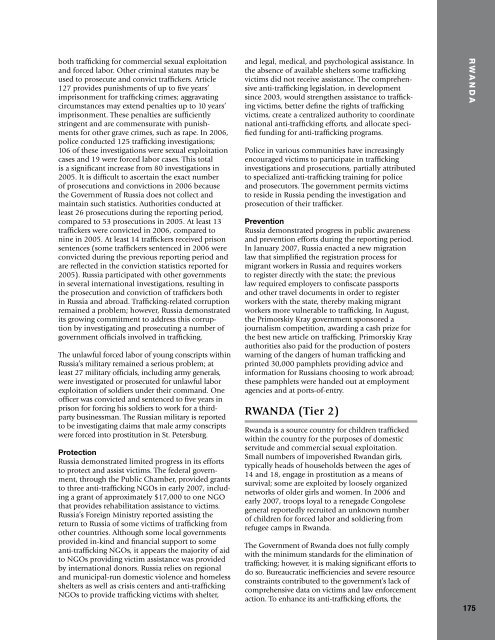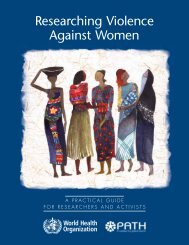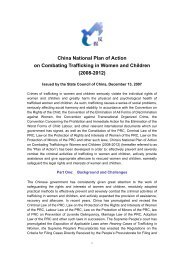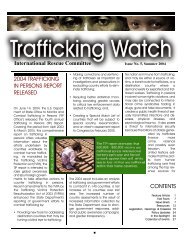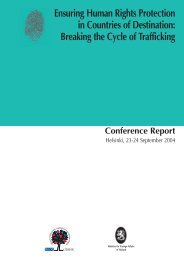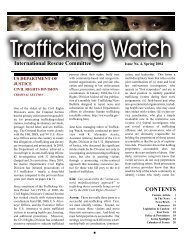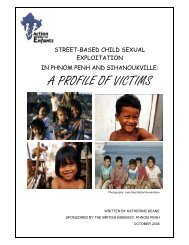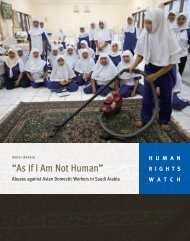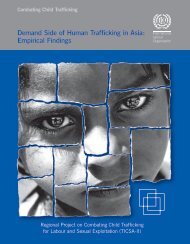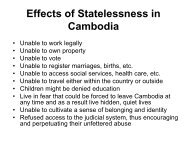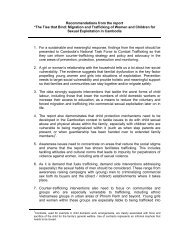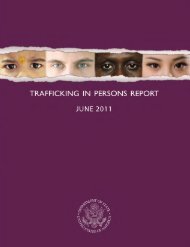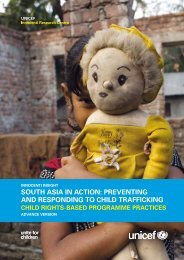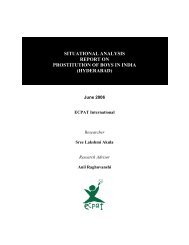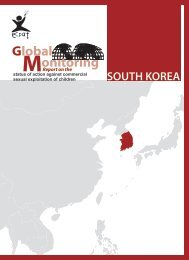2007 Trafficking in Persons Report - Center for Women Policy Studies
2007 Trafficking in Persons Report - Center for Women Policy Studies
2007 Trafficking in Persons Report - Center for Women Policy Studies
Create successful ePaper yourself
Turn your PDF publications into a flip-book with our unique Google optimized e-Paper software.
oth traffick<strong>in</strong>g <strong>for</strong> commercial sexual exploitation<br />
and <strong>for</strong>ced labor. Other crim<strong>in</strong>al statutes may be<br />
used to prosecute and convict traffickers. Article<br />
127 provides punishments of up to five years’<br />
imprisonment <strong>for</strong> traffick<strong>in</strong>g crimes; aggravat<strong>in</strong>g<br />
circumstances may extend penalties up to 10 years’<br />
imprisonment. These penalties are sufficiently<br />
str<strong>in</strong>gent and are commensurate with punishments<br />
<strong>for</strong> other grave crimes, such as rape. In 2006,<br />
police conducted 125 traffick<strong>in</strong>g <strong>in</strong>vestigations;<br />
106 of these <strong>in</strong>vestigations were sexual exploitation<br />
cases and 19 were <strong>for</strong>ced labor cases. This total<br />
is a significant <strong>in</strong>crease from 80 <strong>in</strong>vestigations <strong>in</strong><br />
2005. It is difficult to ascerta<strong>in</strong> the exact number<br />
of prosecutions and convictions <strong>in</strong> 2006 because<br />
the Government of Russia does not collect and<br />
ma<strong>in</strong>ta<strong>in</strong> such statistics. Authorities conducted at<br />
least 26 prosecutions dur<strong>in</strong>g the report<strong>in</strong>g period,<br />
compared to 53 prosecutions <strong>in</strong> 2005. At least 13<br />
traffickers were convicted <strong>in</strong> 2006, compared to<br />
n<strong>in</strong>e <strong>in</strong> 2005. At least 14 traffickers received prison<br />
sentences (some traffickers sentenced <strong>in</strong> 2006 were<br />
convicted dur<strong>in</strong>g the previous report<strong>in</strong>g period and<br />
are reflected <strong>in</strong> the conviction statistics reported <strong>for</strong><br />
2005). Russia participated with other governments<br />
<strong>in</strong> several <strong>in</strong>ternational <strong>in</strong>vestigations, result<strong>in</strong>g <strong>in</strong><br />
the prosecution and conviction of traffickers both<br />
<strong>in</strong> Russia and abroad. <strong>Traffick<strong>in</strong>g</strong>-related corruption<br />
rema<strong>in</strong>ed a problem; however, Russia demonstrated<br />
its grow<strong>in</strong>g commitment to address this corruption<br />
by <strong>in</strong>vestigat<strong>in</strong>g and prosecut<strong>in</strong>g a number of<br />
government officials <strong>in</strong>volved <strong>in</strong> traffick<strong>in</strong>g.<br />
The unlawful <strong>for</strong>ced labor of young conscripts with<strong>in</strong><br />
Russia’s military rema<strong>in</strong>ed a serious problem; at<br />
least 27 military officials, <strong>in</strong>clud<strong>in</strong>g army generals,<br />
were <strong>in</strong>vestigated or prosecuted <strong>for</strong> unlawful labor<br />
exploitation of soldiers under their command. One<br />
officer was convicted and sentenced to five years <strong>in</strong><br />
prison <strong>for</strong> <strong>for</strong>c<strong>in</strong>g his soldiers to work <strong>for</strong> a thirdparty<br />
bus<strong>in</strong>essman. The Russian military is reported<br />
to be <strong>in</strong>vestigat<strong>in</strong>g claims that male army conscripts<br />
were <strong>for</strong>ced <strong>in</strong>to prostitution <strong>in</strong> St. Petersburg.<br />
Protection<br />
Russia demonstrated limited progress <strong>in</strong> its ef<strong>for</strong>ts<br />
to protect and assist victims. The federal government,<br />
through the Public Chamber, provided grants<br />
to three anti-traffick<strong>in</strong>g NGOs <strong>in</strong> early <strong>2007</strong>, <strong>in</strong>clud<strong>in</strong>g<br />
a grant of approximately $17,000 to one NGO<br />
that provides rehabilitation assistance to victims.<br />
Russia’s Foreign M<strong>in</strong>istry reported assist<strong>in</strong>g the<br />
return to Russia of some victims of traffick<strong>in</strong>g from<br />
other countries. Although some local governments<br />
provided <strong>in</strong>-k<strong>in</strong>d and f<strong>in</strong>ancial support to some<br />
anti-traffick<strong>in</strong>g NGOs, it appears the majority of aid<br />
to NGOs provid<strong>in</strong>g victim assistance was provided<br />
by <strong>in</strong>ternational donors. Russia relies on regional<br />
and municipal-run domestic violence and homeless<br />
shelters as well as crisis centers and anti-traffick<strong>in</strong>g<br />
NGOs to provide traffick<strong>in</strong>g victims with shelter,<br />
and legal, medical, and psychological assistance. In<br />
the absence of available shelters some traffick<strong>in</strong>g<br />
victims did not receive assistance. The comprehensive<br />
anti-traffick<strong>in</strong>g legislation, <strong>in</strong> development<br />
s<strong>in</strong>ce 2003, would strengthen assistance to traffick<strong>in</strong>g<br />
victims, better def<strong>in</strong>e the rights of traffick<strong>in</strong>g<br />
victims, create a centralized authority to coord<strong>in</strong>ate<br />
national anti-traffick<strong>in</strong>g ef<strong>for</strong>ts, and allocate specified<br />
fund<strong>in</strong>g <strong>for</strong> anti-traffick<strong>in</strong>g programs.<br />
Police <strong>in</strong> various communities have <strong>in</strong>creas<strong>in</strong>gly<br />
encouraged victims to participate <strong>in</strong> traffick<strong>in</strong>g<br />
<strong>in</strong>vestigations and prosecutions, partially attributed<br />
to specialized anti-traffick<strong>in</strong>g tra<strong>in</strong><strong>in</strong>g <strong>for</strong> police<br />
and prosecutors. The government permits victims<br />
to reside <strong>in</strong> Russia pend<strong>in</strong>g the <strong>in</strong>vestigation and<br />
prosecution of their trafficker.<br />
Prevention<br />
Russia demonstrated progress <strong>in</strong> public awareness<br />
and prevention ef<strong>for</strong>ts dur<strong>in</strong>g the report<strong>in</strong>g period.<br />
In January <strong>2007</strong>, Russia enacted a new migration<br />
law that simplified the registration process <strong>for</strong><br />
migrant workers <strong>in</strong> Russia and requires workers<br />
to register directly with the state; the previous<br />
law required employers to confiscate passports<br />
and other travel documents <strong>in</strong> order to register<br />
workers with the state, thereby mak<strong>in</strong>g migrant<br />
workers more vulnerable to traffick<strong>in</strong>g. In August,<br />
the Primorskiy Kray government sponsored a<br />
journalism competition, award<strong>in</strong>g a cash prize <strong>for</strong><br />
the best new article on traffick<strong>in</strong>g. Primorskiy Kray<br />
authorities also paid <strong>for</strong> the production of posters<br />
warn<strong>in</strong>g of the dangers of human traffick<strong>in</strong>g and<br />
pr<strong>in</strong>ted 30,000 pamphlets provid<strong>in</strong>g advice and<br />
<strong>in</strong><strong>for</strong>mation <strong>for</strong> Russians choos<strong>in</strong>g to work abroad;<br />
these pamphlets were handed out at employment<br />
agencies and at ports-of-entry.<br />
RWANDA (Tier 2)<br />
Rwanda is a source country <strong>for</strong> children trafficked<br />
with<strong>in</strong> the country <strong>for</strong> the purposes of domestic<br />
servitude and commercial sexual exploitation.<br />
Small numbers of impoverished Rwandan girls,<br />
typically heads of households between the ages of<br />
14 and 18, engage <strong>in</strong> prostitution as a means of<br />
survival; some are exploited by loosely organized<br />
networks of older girls and women. In 2006 and<br />
early <strong>2007</strong>, troops loyal to a renegade Congolese<br />
general reportedly recruited an unknown number<br />
of children <strong>for</strong> <strong>for</strong>ced labor and soldier<strong>in</strong>g from<br />
refugee camps <strong>in</strong> Rwanda.<br />
The Government of Rwanda does not fully comply<br />
with the m<strong>in</strong>imum standards <strong>for</strong> the elim<strong>in</strong>ation of<br />
traffick<strong>in</strong>g; however, it is mak<strong>in</strong>g significant ef<strong>for</strong>ts to<br />
do so. Bureaucratic <strong>in</strong>efficiencies and severe resource<br />
constra<strong>in</strong>ts contributed to the government’s lack of<br />
comprehensive data on victims and law en<strong>for</strong>cement<br />
action. To enhance its anti-traffick<strong>in</strong>g ef<strong>for</strong>ts, the<br />
R W A N D A<br />
175


